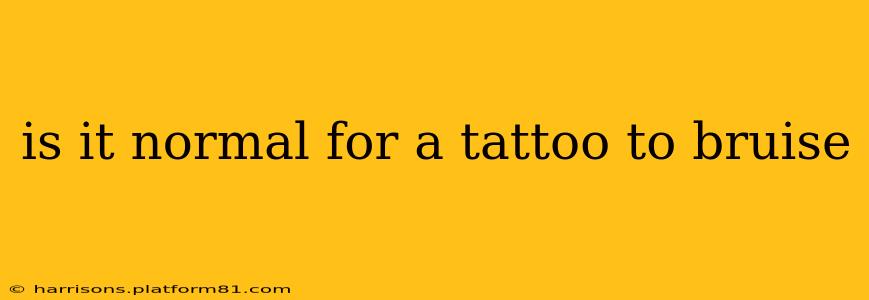Getting a tattoo is a commitment, a form of self-expression that leaves a lasting mark (literally!). While the anticipation and excitement are high, the aftercare and potential side effects can be a source of worry for many. One common concern is bruising. So, is it normal for a tattoo to bruise? The short answer is: yes, bruising is fairly common after getting a tattoo.
The tattooing process involves the insertion of ink into the dermis layer of your skin using needles. This process inevitably causes some trauma to the skin, leading to minor injuries and potential bruising. The severity of bruising depends on several factors, which we'll explore in detail below.
Why Does My Tattoo Bruise?
The appearance of bruising after a tattoo is a direct result of the needle puncturing the skin. This punctures small blood vessels, causing blood to leak into the surrounding tissue. This blood shows up as a bruise, often appearing as a discoloration ranging from red and purple to yellow and green as the blood breaks down and heals. Think of it like a minor injury, similar to a small cut or scrape—only on a larger scale.
How Long Does Tattoo Bruising Last?
The duration of tattoo bruising varies greatly depending on individual factors and the size and location of the tattoo. Generally, you can expect the bruising to last anywhere from a few days to a couple of weeks. Smaller tattoos in less vascular areas tend to bruise less and heal faster. Larger tattoos in areas with more blood vessels, like the thighs or ribs, are more prone to significant bruising and may take longer to heal completely.
What Factors Influence Tattoo Bruising?
Several factors can contribute to the amount of bruising you experience after getting a tattoo:
- Needle Depth: A deeper needle insertion is more likely to cause bruising. Experienced tattoo artists are skilled at minimizing this.
- Tattoo Size and Location: Larger tattoos and those in areas with a higher concentration of blood vessels (like the inner thighs or ribs) are more prone to bruising.
- Individual Skin Type and Coagulation: Some individuals naturally bruise more easily than others due to differences in skin type and blood clotting factors.
- Artist Technique: A skilled and experienced tattoo artist will minimize trauma to the skin, reducing the likelihood of excessive bruising.
- Medication: Certain medications, like blood thinners, can increase bruising.
What Should I Do If My Tattoo Bruises?
Generally, minor bruising is a normal part of the tattoo healing process. However, it's crucial to follow your tattoo artist's aftercare instructions diligently to promote healing and minimize complications. These instructions typically involve keeping the tattoo clean, moisturized, and protected from the sun.
When to Seek Medical Attention:
While some bruising is expected, you should seek medical attention if you experience:
- Excessive or Severe Bruising: If the bruising is extensive, spreading rapidly, or accompanied by significant pain or swelling.
- Signs of Infection: Redness, swelling, increased pain, pus, or fever are all signs of potential infection and require immediate medical attention.
- Persistent Bruising: If the bruising persists for an unusually long time (more than a few weeks) or doesn’t seem to be healing.
Is It Possible to Prevent Tattoo Bruising?
While you can't entirely prevent bruising, you can take steps to minimize the risk:
- Choose an Experienced Artist: A skilled artist is more adept at minimizing trauma to the skin.
- Stay Hydrated: Proper hydration helps with blood flow and healing.
- Avoid Blood Thinners (If Possible): If you're on blood thinners, consult your doctor before getting a tattoo.
- Follow Aftercare Instructions Carefully: Proper aftercare significantly contributes to faster healing and reduces the risk of complications.
Can I Use Ice on a Bruised Tattoo?
Applying ice packs wrapped in a clean cloth to a bruised tattoo can help minimize swelling and discomfort. Keep the ice packs on for short periods (15-20 minutes) and avoid direct contact with the skin.
Conclusion
In short, some degree of bruising after getting a tattoo is normal and usually nothing to worry about. However, always follow your artist's aftercare instructions, and don't hesitate to contact a medical professional if you experience excessive bruising, signs of infection, or any other concerning symptoms. Remember, a healthy healing process is crucial for achieving a vibrant and long-lasting tattoo.
